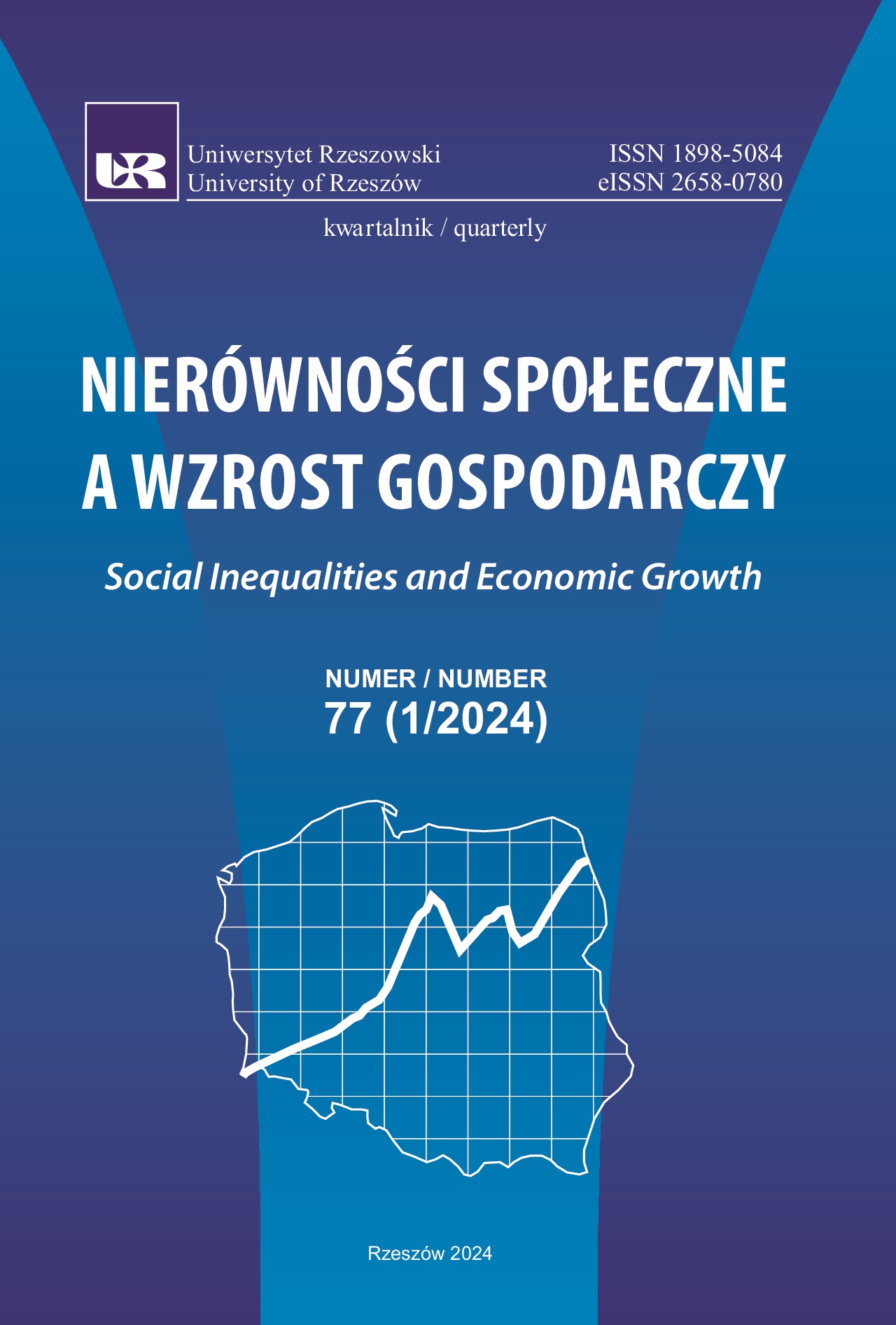Assessment of statutory salaries of teachers in Poland in the context of the theory of measuring human capital and fair remuneration
DOI:
https://doi.org/10.15584/nsawg.2024.1.7Keywords:
human capital, fair remuneration, teachers’ salariesAbstract
The teaching profession is recognised as one of the professions of public trust. It is teachers and parents who shape the human capital of future employees. A person undertaking this job should have appropriate predispositions as well as competences based on specific and pedagogical qualifications. A teacher’s job is responsible and can also be stressful. In primary schools and kindergartens, this profession is regulated by the Teacher’s Charter Act, which in turn stipulates that teachers should have: higher education and pedagogical preparation, appropriate knowledge and adequate health, and that they should follow basic moral principles because they are role models for students.
The aim of the study is to assess the fairness of teachers’ statutory salaries. Unfortunately, in recent years, this profession has been very neglected and undervalued. Teachers often leave school for business, which is mainly due to inadequate remuneration for this profession. Additionally, frustration and social anxiety have led to the depreciation of this profession, and it is the primary school teacher who has a significant impact on the development of each student’s human capital. It can be said that teachers contribute to shaping the value of the human capital of subsequent generations who will enter the labour market and have a huge impact on the development of the economy and society. Their work is important to society and should be fairly remunerated. It should, but it is not. Currently, a beginner teacher (university graduate) is remunerated at the same level as an 18-year-old leaving school and starting work in a store, bakery or car repair shop.
Downloads
References
Wysokość minimum socjalnego. Pobrane z: https://www.ipiss.com.pl/pion-badawczy-po¬lityki-spolecznej/wysokosc-minimum-socjalnego/ (2023.12.21).
Dobija, M. (2002a). Struktura i koszt kapitału. Zeszyty Naukowe Akademii Ekonomicznej w Krakowie, 562, 59–67.
Dobija, M. (2002b). Kapitał ludzki i intelektualny w aspekcie teorii rachunkowości. Przegląd Organizacji, 1, 8–13. DOI: https://doi.org/10.33141/po.2002.01.02
Dobija, M. (2007). Premia za ryzyko jako naturalna stała w ekonomii wolnorynkowej. W: W. Tarczyński (red.), Rynek kapitałowy: skuteczne inwestowanie, cz. I (s. 29–46). Szczecin: Wydawnictwo Naukowe Uniwersytetu Szczecińskiego.
Kozioł, W. (2010). Pomiar kapitału ludzkiego jako podstawa kształtowania relacji płac w organizacji. Rozprawa doktorska. Kraków: Uniwersytet Ekonomiczny w Krakowie.
Kozioł, W. (2011). Stała potencjalnego wzrostu w rachunku kapitału ludzkiego. Nierówności Społeczne a Wzrost Gospodarczy, 19, 252–260.
Kowalski, M. (2023). Podwyżki dla nauczycieli w 2024 r. – ile wyniosą. Pobrane z: https://www.portaloswiatowy.pl/projekty-aktow-prawnych-dla-oswiaty/podwyzki¬-dla-nauczycieli-w-2024-r.-ile-wyniosa-23790.html (2023.12.21).
Kurek, B. (2011). Hipoteza deterministycznej premii za ryzyko, Monografie: Prace Doktorskie, nr 10. Kraków: Wydawnictwo Uniwersytetu Ekonomicznego w Krakowie.
Kurek, B., Górowski, I. (2020). Gender and Age as Determinants of Expected Rate of Return on Human Capital. Central European Management Journal, 28(4), 30–50. DOI: 10.7206/cemj.2658-0845.33. DOI: https://doi.org/10.7206/cemj.2658-0845.33
Oliwkiewicz, B. (2018). Oczekiwania płacowe a godziwe wynagrodzenie absolwentów studiów ekonomicznych. Rozprawa doktorska. Kraków: Uniwersytet Ekonomiczny w Krakowie.
Oliwkiewicz, B. (2019). The impact of capital from experience on the value of an employee’s fair remuneration. Prace Naukowe Uniwersytetu we Wrocławiu, 63(10), 207–220. DOI: 10.15611/pn.2019.10.15. DOI: https://doi.org/10.15611/pn.2019.10.15
Oliwkiewicz, B. (2020). Oczekiwania płacowe a godziwe wynagrodzenie absolwentów studiów ekonomicznych. W: D. Fatuła (red.), Zarządzanie zrównoważonym rozwojem organizacji (s. 67–94). Kraków: Oficyna Wydawnicza AFM.
Ossowski, M. (2006). Jak w praktyce korzystać z krzywej uczenia się. Controlling i Rachunkowość Zarządcza, 2, 29–30.
Renkas, J. (2014). Teoria pomiaru kapitału ludzkiego jako podstawa analizy wynagrodzeń w gospodarce Ukrainy. Rozprawa doktorska. Kraków: Uniwersytet Ekonomiczny w Krakowie.
Rozporządzenie Ministra Edukacji i Nauki z dnia 24 lutego 2023 r. (Dz.U. z 2023 r., poz. 352).
Ustawa z dnia 26 stycznia 1982 r. Karta Nauczyciela (tekst jedn. Dz.U. z 2023 r., poz. 984).
Downloads
Published
How to Cite
Issue
Section
License
Copyright (c) 2024 University of Rzeszow

This work is licensed under a Creative Commons Attribution-NonCommercial-NoDerivatives 4.0 International License.


